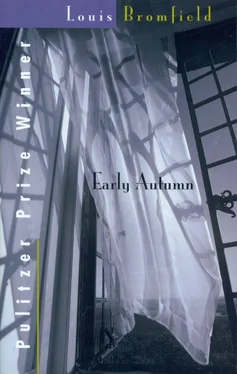It was the old woman who answered. Looking gravely at Olivia, she said, with an air of confidence, “You know I never speak to her at all. She’s common. She’s a common Irish servant. They can shut me up with her, but they can’t make me speak to her.” And then she began to drift back again into the hopeless state that was so much more familiar. She began to mumble over and over again a chain of words and names which had no coherence.
Olivia and Miss Egan ignored her, as if part of her—the vaguely rational old woman—had disappeared, leaving in her place this pitiful chattering creature who was a stranger.
Olivia explained where it was she found the old woman and why she had gone there.
“She’s been talking on the subject for days,” said Miss Egan. “I think it’s letters that she’s looking for, but it may be nothing at all. She mixes everything terribly.”
Olivia was shivering now in her nightdress, more from weariness and nerves than from the chill of the night.
“I wouldn’t speak of it to any of the others, Miss Egan,” she said. “It will only trouble them. And we must be more careful about her in the future.”
The old woman had gone past them now, back into the dark room where she spent her whole life, and the nurse had begun to recover a little of her defiant confidence. She even smiled, the hard, glittering smile which always said, “You cannot do without me, whatever happens.”
Aloud she said, “I can’t imagine what happened, Mrs. Pentland.”
“It was an accident, never mind,” said Olivia. “Good-night. Only I think it’s better not to speak of what has happened. It will only alarm the others.”
But she was puzzled, Olivia, because underneath the dressing gown Miss Egan had thrown about her shoulders she saw that the nurse was dressed neither in night clothes nor in her uniform, but in the suit of blue serge that she wore on the rare occasions when she went into the city.
5
She spoke to no one of what had happened, either on the terrace or in the lane or in the depths of the old attic, and the days came to resume again their old monotonous round, as if the strange, hot, disturbing night had had no more existence than a dream. She did not see O’Hara, yet she heard of him, constantly, from Sybil, from Sabine, even from Jack, who seemed stronger than he had ever been and able for a time to go about the farm with his grandfather in the trap drawn by an old white horse. There were moments when it seemed to Olivia that the boy might one day be really well, and yet there was never any real joy in those moments, because always in the back of her mind stood the truth. She knew it would never be, despite all that fierce struggle which she and the old man kept up perpetually against the thing which was stronger than either of them. Indeed, she even found a new sort of sadness in the sight of the pale thin boy and the rugged old man driving along the lanes in the trap, the eyes of the grandfather bright with a look of deluding hope. It was a look which she found unbearable because it was the first time in years, almost since that first day when Jack, as a tiny baby who did not cry enough, came into the world, that the expression of the old man had changed from one of grave and uncomplaining resignation.
Sometimes when she watched them together she was filled with a fierce desire to go to John Pentland and tell him that it was not her fault that there were not more children, other heirs to take the place of Jack. She wanted to tell him that she would have had ten children if it were possible, that even now she was still young enough to have more children. She wanted to pour out to him something of that hunger of life which had swept over her on the night in Sabine’s garden beneath the apple tree, a spot abounding in fertility. But she knew, too, how impossible it was to discuss a matter which old John Pentland, in the depths of his soul believed to be “indelicate.” Such things were all hidden behind a veil which shut out so much of truth from all their lives. There were times when she fancied he understood it all, those times when he took her hand and kissed her affectionately. She fancied that he understood and that the knowledge lay somehow at the root of the old man’s quiet contempt for his own son.
But she saw well enough the tragedy that lay deep down at the root of the whole matter. She understood that it was not Anson who was to blame. It was that they had all been caught in the toils of something stronger than any of them, a force which with a cruel injustice compelled her to live a dry, monotonous, barren existence when she would have embraced life passionately, which compelled her to watch her own son dying slowly before her eyes.
Always she came back to the same thought, that the boy must be kept alive until his grandfather was dead; and sometimes, standing on the terrace, looking out across the fields, Olivia saw that old Mrs. Soames, dressed absurdly in pink, with a large picture hat, was riding in the trap with the old man and his grandson, as if in reality she were the grandmother of Jack instead of the mad old woman upstairs.
The days came to resume their round of dull monotony, and yet there was a difference, odd and indefinable, as if in some way the sun were brighter than it had been, as if those days, when even in the bright sunlight the house had seemed a dull gray place, were gone now. She could no longer look across the meadows toward the bright new chimneys of O’Hara’s house without a sudden quickening of breath, a warm pleasant sensation of no longer standing quite alone.
She was not even annoyed any longer by the tiresome daily visits of Aunt Cassie, nor by the old woman’s passion for pitying her and making wild insinuations against Sabine and O’Hara and complaining of Sybil riding with him in the mornings over the dew-covered fields. She was able now simply to sit there politely as she had once done, listening while the old woman talked on and on; only now she did not even listen with attention. It seemed to her at times that Aunt Cassie was like some insect beating itself frantically against a pane of glass, trying over and over again with an unflagging futility to enter where it was impossible to enter.
It was Sabine who gave her a sudden glimpse of penetration into this instinct about Aunt Cassie, Sabine who spent all her time finding out about people. It happened one morning that the two clouds of dust, the one made by Aunt Cassie and the other by Sabine, met at the very foot of the long drive leading up to Pentlands, and together the two women—one dressed severely in shabby black, without so much as a fleck of powder on her nose, the other dressed expensively in what some Paris dressmaker chose to call a costume de sport, with her face made up like a Parisian—arrived together to sit on the piazza of Pentlands insulting each other subtly for an hour. When at last Sabine managed to outstay Aunt Cassie (it was always a contest between them, for each knew that the other would attack her as soon as she was out of hearing) she turned to Olivia and said abruptly, “I’ve been thinking about Aunt Cassie, and I’m sure now of one thing. Aunt Cassie is a virgin!”
There was something so cold-blooded and sudden in the statement that Olivia laughed.
“I’m sure of it,” persisted Sabine with quiet seriousness. “Look at her. She’s always talking about the tragedy of her being too frail ever to have had children. She never tried. That’s the answer. She never tried.” Sabine tossed away what remained of the cigarette she had lighted to annoy Aunt Cassie, and continued, “You never knew my Uncle Ned Struthers when he was young. You only knew him as an old man with no spirit left. But he wasn’t that way always. It’s what she did to him. She destroyed him. He was a full-blooded kind of man who liked drinking and horses and he must have liked women, too, but she cured him of that. He would have liked children, but instead of a wife he only got a woman who couldn’t bear the thought of not being married and yet couldn’t bear what marriage meant. He got a creature who fainted and wept and lay on a sofa all day, who got the better of him because he was a nice, stupid, chivalrous fellow.”
Читать дальше












